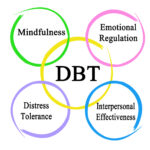Considerations for Goal Setting in the New Year
Picture this. It’s the week after Christmas and you’re finally catching a break from the busy weeks of shopping, wrapping, planning, traveling, and socializing this season so often brings. You’re exhausted. You could probably sleep for the next three days if you could get away with it. The
year is coming to a close, however, and there’s a nagging thought in the back of your mind that it’s probably time to set yourself some goals for the New Year. You might think,
I really need to start exercising. I should spend less time on my phone. I need to limit my alcohol use. I’d like to spend more time with my kids. I ought to work towards paying down my credit card. I have to lose some weight.
There are so many changes you could make. Perhaps too many. How do you begin to choose? As you wrestle with these reflections, you realize you can’t even remember what your resolutions were for 2024. And if you’re like most people, you probably fell off the tracks by the end of January anyway. You find yourself growing hesitant, wondering if it’s worth trying again in the new year. You ask yourself,
Will anything actually change? Can I even keep that commitment? What if something goes wrong? What if I can’t do it?
According to Pew Research, New Year resolutions are growing less common among Americans, especially as we age (Gracia 2024). The reasons? Because we don’t like them. Because we fail. Sometimes it’s because we can’t think of anything (my take: we’re actually overburdened by decision paralysis), or because we genuinely forget. Either way, it’s clear that the New Year doesn’t always bring about the idealistic inspiration for change or a newfound sense of motivation we may hope for.
If you’re feeling overwhelmed or discouraged by the unspoken expectation to set hard and fast goals for yourself in this season, please remember that you’re not alone. Change can be incredibly difficult. It takes a lot of support, preparation, and sacrifice to be successful. Our New Year’s resolutions fail so often because most of us don’t know how to prepare for the changes we intend to make. You buy the gym membership, for example, and regularly work out for the first few weeks. But then you get sick. Or you hit a plateau and you’re unsure how to navigate around it. Maybe your budget or your schedule changes and you can’t afford to go anymore. Life gets in the way and before you know it, you find yourself riddled with feelings of failure. So what can you do? Here are some thoughts to consider:
- Ensure you have both the capacity and the resources to set and sustain goals in the first place. Maybe this means waiting for a less-stressful time of the year, like when your seasonal depression doesn’t feel so heavy or when the kids are finally back in school. Perhaps it means building a support system, restarting therapy, seeing your doctor, or setting some boundaries to protect your time and energy. Jumping into a goal or resolution without a plan isn’t unlike running a marathon on a whim. Sure, you might get through the first mile or two, but the likelihood that you’ll finish is practically nonexistent.
- Consider using a tool like SMART goals to help you get started. You can easily Google this, but to summarize, SMART is an acronym for setting goals that are:
- Specific: What exactly do you want to accomplish? What do you want to change?
- Measurable: How will you know you’re making progress? What tools can you use to keep track?
- Achievable: Is this goal realistic? Do you have the necessary resources to follow through?
- Relevant: What makes this goal important? How will it benefit you?
- Time-bound: What does the commitment look like on a day-to-day basis? How much time do you need?
- Skip out on goal setting and consider focusing on intentionality instead. Setting intentions for yourself is a gentle way of introducing both mindfulness and change, especially if you’re hoping to enact lifelong patterns or skills that will improve your overall wellbeing. Intentions don’t have to be as specific as goal setting, which means there’s a lot more flexibility for adapting or changing direction. One intention, for example, may be to speak more kindly to yourself. Rather than working towards eliminating that harsh inner critic, you decide to practice a sense of curiosity– Where are these thoughts coming from? Where else have I heard them? Are they objective? How would I respond if my friend or child said this about themselves? How can I practice gentleness and compassion towards myself when I am hurting? Hopefully as you practice this subtle shift in mindset, you’ll find over time that your inner critic has softened substantially. And should the self-critique grow harsh again, you’ll know exactly how to respond.
- Know when to give yourself a break. Sometimes the ability to set and work towards goals isn’t manageable, especially if you’re facing rigorous physical or mental health challenges like grief, trauma, chronic illness, or other imminent conditions that interfere with daily functioning. Situations like these often force a person into survival mode, and when that happens, the prefrontal cortex (the part of the brain responsible for planning, strategizing, making decisions, learning, focusing, and memory) essentially shuts down. This means the ability to set and work towards accomplishing goals is heavily compromised– so it doesn’t make sense to keep pushing yourself. Signs of survival mode often include feelings of despair or numbness, anxiety, irritability, sleep disturbances, dissociation, memory problems, appetite changes, withdrawing from others, a loss of motivation, and more. If this sounds familiar and you haven’t already, consider finding a therapist. They can help you process your emotions, navigate life stressors, and equip you with the tools you need to bring about healing so that in time, you feel more confident and capable of working towards any goals or resolutions you’d like to achieve.

